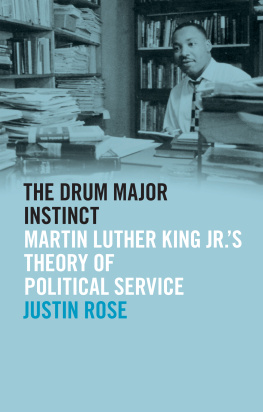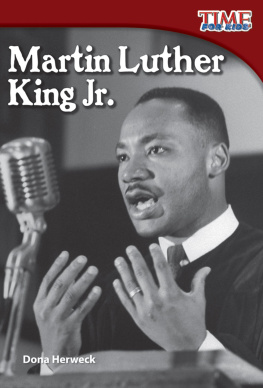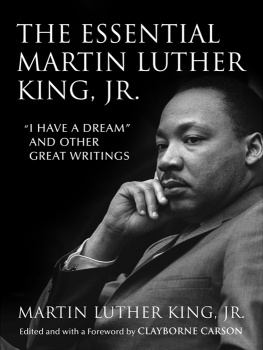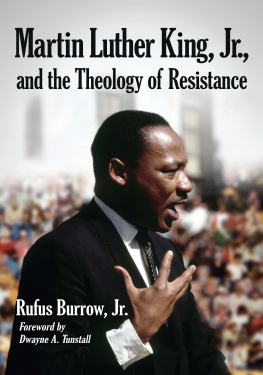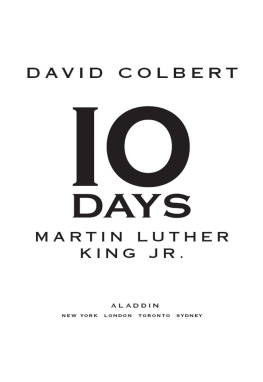THE DRUM MAJOR INSTINCT
GENERAL EDITOR
Vicki L. Crawford
The King Collection
ADVISORY BOARD
Lewis V. Baldwin
Vanderbilt University
Emilye Crosby
State University of New York, Geneseo
Adam Fairclough
Leiden University
Robert M. Franklin
Emory University
Franoise N. Hamlin
Brown University
Randal Jelks
University of Kansas
Barbara McCaskill
University of Georgia
Kathryn L. Nasstrom
University of San Francisco
Rev. Raphael Gamaliel Warnock
Ebenezer Baptist Church, Atlanta, Georgia
THE DRUM MAJOR INSTINCT
MARTIN LUTHER KING JR.S THEORY OF POLITICAL SERVICE
JUSTIN ROSE
THE UNIVERSITY OF GEORGIA PRESS ATHENS
A Sarah Mills Hodge Fund Publication
This publication is made possible in part through a grant from the Hodge
Foundation in memory of its founder, Sarah Mills Hodge, who devoted her
life to the relief and education of African Americans in Savannah, Georgia.
2019 by the University of Georgia Press
Athens, Georgia 30602
www.ugapress.org
All rights reserved
Set in 9.5/13.5 Utopia Std by Kaelin Chappell Broaddus
Most University of Georgia Press titles are
available from popular e-book vendors.
Printed digitally
Library of Congress Cataloging-in-Publication Data
Names: Rose, Justin, 1982 author.
Title: The drum major instinct : Martin Luther King Jr.s theory of political
service / Justin Rose.
Description: Athens : The University of Georgia Press, [2019] | Series: The
Morehouse College King Collection series on civil & human rights |
Includes bibliographical references and index.
Identifiers: LCCN 2018054026| ISBN 9780820355528 (hardcover : alk. paper) |
ISBN 9780820355542 (pbk. : alk. paper) | ISBN 9780820355535 (ebook)
Subjects: LCSH: King, Martin Luther, Jr., 19291968Political and social views.
| Social actionUnited StatesHistory20th century.
Classification: LCC E185.97.K5 R5978 2019 | DDC 323.092 [B] dc23
LC record available at https://lccn.loc.gov/2018054026
Dedicated to the loving memory of
Hannah TeklemariamCONTENTS
ACKNOWLEDGMENTS
This book feels as if it were a lifetime in the making. Consequently, it will be impossible to thank all the people who deserve credit for some aspect of this project. However, I must begin by thanking Lawrie Balfour, Melvin Rogers, Stephen K. White, and Claudrena Harold for their mentorship and belief in this project.
Along the way, this project has benefited from great colleagues who have aided my project tremendously. This list includes but is not limited to Greta Snydor, William Umphres, John Thabiti Willis, Kim Gallon, Rodmon King, Khuram Hussain, Ervin Kosta, James McCorkle, Kevin Dunn, Susan Brewer-Osorio, Cedric Johnson, Heather May, Tremayne Robertson, Renee Grant, Tiffany Barber, Ed Brockenbrough, Sheldon Fields (and household), and all my great colleagues in the Department of Political Science and the Africana Studies Program at Hobart and William Smith Colleges (HWS).
I am also extremely grateful for the Jefferson Scholars Foundation of the University of Virginia for helping to fund the early years of my research. This project also benefitted from the leadership and funding provided by Provost Titilayo Ufomata at HWS. Finally, I thank the Center for Teaching and Learning at HWS for sponsoring retreats that have greatly aided the writing of this project.
Special thanks to Vicki Crawford, Walter Biggins, the entire staff of the University of Georgia Press, and my reviewers.
Last, but certainly not least, I want to give a heartfelt thanks to my closest friends and family who have provided encouragement and faith at every step of this process. Although there are too many to name, I need to single out Lynne Magruder, Hassan Assad, and Brad Burke for special recognition.
Ultimately, this book would not be a reality without three individuals, above all else. First, and foremost, is my good friend and colleague Andrew Douglas. I am forever indebted for his friendship and countless hours reading and conversing about my project. Thank you! Finally, I want to acknowledge the tremendous sacrifice, unconditional love, and incessant support of Solom and Miles Rose. You two are truly the salt of the earth.
THE DRUM MAJOR INSTINCT
INTRODUCTION
THE DRUM MAJOR INSTINCT
Jesus gave us a new norm of greatness. If you want to be importantwonderful. If you want to be recognizedwonderful. If you want to be greatwonderful. But recognize that he who is greatest among you shall be your servant.
MARTIN LUTHER KING JR.
On a serene Sunday in October 2011, the Martin Luther King, Jr. Memorial was officially dedicated on the National Mall. Although the newly erected monument made King the first black American and nonpresident to be granted such an honor, it was not without its critics. Specifically, Maya Angelou, who was one of the consultants for the memorial, took issue with an inscription etched into the north side of the towering statue that read, I was a drum major for justice, peace and righteousness. Rather than directly quoting King, the statement paraphrased a section of Kings 1968 The Drum Major Instinct sermon. In the actual quotation King (1986) said, If you want to say that I was a drum major, say that I was a drum major for justice. Say that I was a drum major for peace. I was a drum major for righteousness (267). According to Angelou, [King] had a humility that comes from deep inside. The if clause that is left out is salient. Leaving it out changes the meaning completely. Rather than honoring Kings deeply held commitments, Angelou charged that the monument made him look like an arrogant twit (Weingarten and Ruane 2011). Others agreed, and, bowing to growing criticism, the Department of the Interior decided to remove the quotation altogether.
The profound irony of the monuments self-aggrandizing inscription is that Kings sermon was not an exercise in self-glorification; rather, he
Even though King had misgivings about the drum major instinct, he also believed that, when it is properly channeled, the drive for greatness is a useful trait for Americans to possess. For King (1986), the most important aspect of Jesuss response to James and John was that Jesus did not chastise them for their naked ambition; instead, he reordered priorities (265). King said, Jesus gave us a new norm of greatness. If you want to be importantwonderful. If you want to be recognizedwonderful. If you want to be greatwonderful. But recognize that he who is greatest among you shall be your servant (265). According to King, Jesus taught that the drive to be great is an admirable instinct when greatness is evaluated by how much one serves others. Armed with Jesuss precept, King called on congregants at his Ebenezer Baptist Church to redefine greatness by becoming drum majors in the quest for justice, peace, and righteousness.

